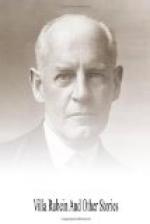eyes, short neck and purplish complexion; he is asthmatic,
and has a very courteous, autocratic manner.
His clothes are made of Harris tweed—except
on Sundays, when he puts on black—a seal
ring, and a thick gold cable chain. There’s
nothing mean or small about John Ford; I suspect him
of a warm heart, but he doesn’t let you know
much about him. He’s a north-country man
by birth, and has been out in New Zealand all his
life. This little Devonshire farm is all he has
now. He had a large “station” in
the North Island, and was much looked up to, kept open
house, did everything, as one would guess, in a narrow-minded,
large-handed way. He came to grief suddenly;
I don’t quite know how. I believe his
only son lost money on the turf, and then, unable to
face his father, shot himself; if you had seen John
Ford, you could imagine that. His wife died,
too, that year. He paid up to the last penny,
and came home, to live on this farm. He told
me the other night that he had only one relation in
the world, his granddaughter, who lives here with him.
Pasiance Voisey—old spelling for Patience,
but they pronounce, it Pash-yence—is sitting
out here with me at this moment on a sort of rustic
loggia that opens into the orchard. Her sleeves
are rolled up, and she’s stripping currants,
ready for black currant tea. Now and then she
rests her elbows on the table, eats a berry, pouts
her lips, and, begins again. She has a round,
little face; a long, slender body; cheeks like poppies;
a bushy mass of black-brown hair, and dark-brown, almost
black, eyes; her nose is snub; her lips quick, red,
rather full; all her motions quick and soft.
She loves bright colours. She’s rather
like a little cat; sometimes she seems all sympathy,
then in a moment as hard as tortoise-shell.
She’s all impulse; yet she doesn’t like
to show her feelings; I sometimes wonder whether she
has any. She plays the violin.
It’s queer to see these two together, queer
and rather sad. The old man has a fierce tenderness
for her that strikes into the very roots of him.
I see him torn between it, and his cold north-country
horror of his feelings; his life with her is an unconscious
torture to him. She’s a restless, chafing
thing, demure enough one moment, then flashing out
into mocking speeches or hard little laughs.
Yet she’s fond of him in her fashion; I saw
her kiss him once when he was asleep. She obeys
him generally—in a way as if she couldn’t
breathe while she was doing it. She’s
had a queer sort of education—history, geography,
elementary mathematics, and nothing else; never been
to school; had a few lessons on the violin, but has
taught herself most of what she knows. She is
well up in the lore of birds, flowers, and insects;
has three cats, who follow her about; and is full
of pranks. The other day she called out to me,
“I’ve something for you. Hold out
your hand and shut your eyes!” It was a large,
black slug! She’s the child of the old




